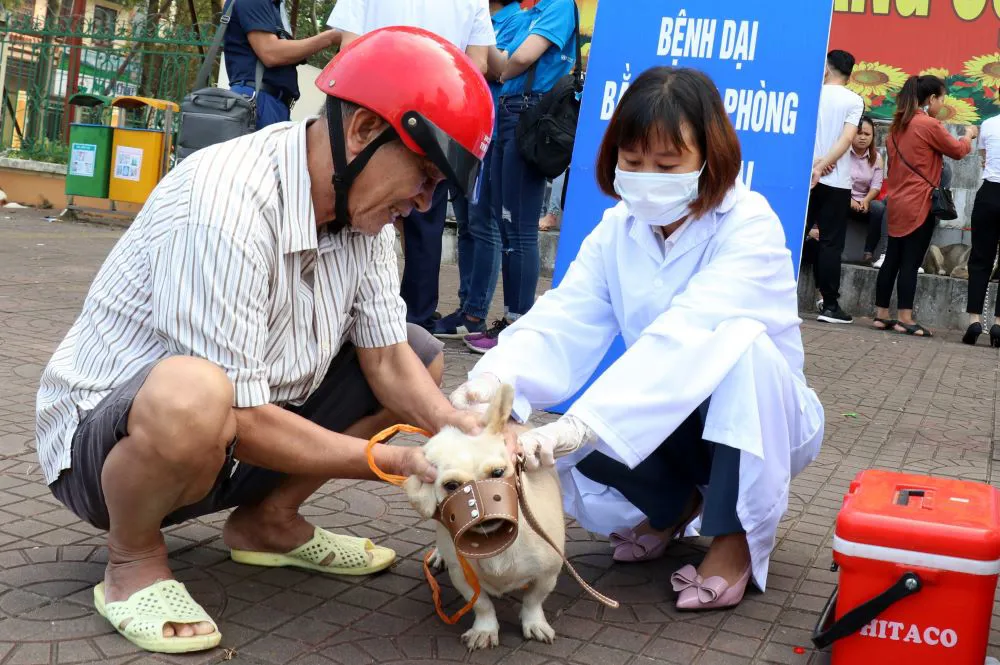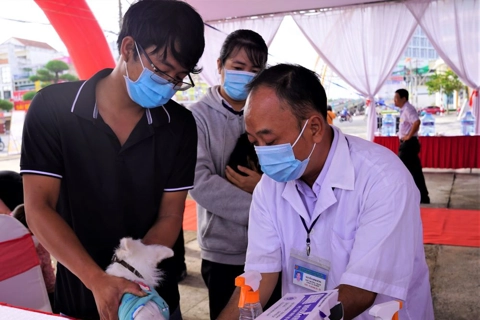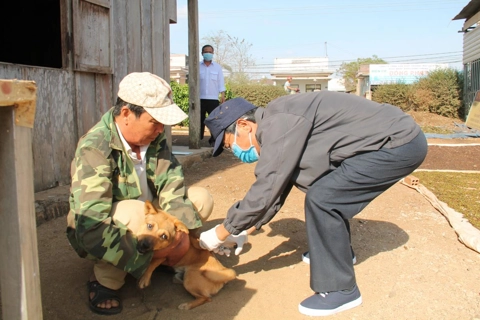Vietnam urged to manage dog populations to end rabies-caused human deaths
It’s necessary to adopt lessons learned and work closely with local governments to ensure a decrease in deaths going forward.
Vietnam needs to prioritize the management of dog populations to end human deaths from dog-mediated rabies in the country which the viral disease claims between 70 and 100 lives per year.
| Dog vaccination in Vietnam. Photo: Quoc Khanh/VNA |
The call was made in response to World Rabies Day on September 28 by leading global public health organizations namely The World Health Organization (WHO) in Vietnam, the Food and Agriculture Organization of the United Nations (FAO) in Vietnam, the US Agency for International Development (USAID), and the United States Centers for Disease Control and Prevention (US CDC).
The country also needs to increase resources for the vaccination of dogs and provision of post-exposure prophylaxis for those bitten by dogs.
Rabies is a rare but very serious infection that affects the brain and nerves. It almost always causes fatal once symptoms appear.
Rabies differs from many other infections in that the development of clinical disease can be prevented through timely immunization even after exposure to the infecting agent. Therefore, human rabies is a 100% vaccine-preventable disease.
For that reason, the WHO said that investment in eliminating the risk of rabies at its source – dogs – is the most cost-effective measure. Vaccination of at least 70% of dogs in areas at risk is now accepted as the most effective way of preventing human rabies deaths.
International efforts
The Government of Vietnam is committed to achieving the 2030 goal of eliminating human deaths from dog-mediated rabies by renewing the National Program on the Control and Elimination of Rabies 2022–2030. In this regard, the WHO, FAO, USAID, and US CDC reaffirm their continued support to the Government in developing essential policies and mechanisms to reduce deaths.
In recognition of World Rabies Day 2023, the Ministry of Health, the Ministry of Agriculture
and Rural Development (MARD), with support from WHO, FAO, USAID, US CDC, and other organizations hosted a joint event and national conference to highlight shared commitment to the “Zero by 30” goal, review results of Vietnam’s program, and discuss opportunities for supporting increased vaccination in dogs.
WHO, FAO, USAID, and US CDC commit to providing ongoing technical support to the Government of Vietnam as they work together to end human deaths from dog-mediated rabies in the country.
Dr Angela Pratt, WHO Representative in Vietnam, emphasized the need for strong commitment and the targeting of priority areas in order to eliminate deaths by 2030. “We must ensure equitable access to vital health services, including rabies post-exposure prophylaxis and pre-exposure prophylaxis, for underserved communities. This will save lives.”
Dr Pratt also reiterated that “strong coordination between animal, human health, and other sectors is vital to ensure prevention and control programs are efficiently and effectively managed.”
Dr Rémi Nono Womdim, FAO Representative in Vietnam, highlighted increasing international and high-level political support for One Health as a sustainable solution to combat threats such as rabies. He stressed the importance of dog vaccination, saying it is the most cost-effective single intervention to protect humans from contracting rabies.
“By working together using the One Health approach, to increase rabies vaccination coverage in animals to reach at least 70%, we can break transmission of rabies to human and accelerate the progress toward Zero by 30 goal”, he added.
Sharing the same view, Dr. Lindsay Kim, Global Health Security Program director, US CDC office in Vietnam, emphasized the role of the One Health approach and assured of CDC support in rabies prevention and control efforts.
“We strongly advocate for the One Health approach, which integrates human, animal, and the environment. The US CDC is proud to support Vietnam in adopting this approach to eliminate rabies deaths by 2030.”
Accordingly, the center is collaborating with MARD and other partners to develop national guidelines for rabies surveillance using the One Health approach.
Meanwhile, Dr. Myat Htoo Razak, Senior Global Health Security Advisor, USAID Vietnam, laid stress on coordinated multi-sectoral responses, especially animal and human health systems and active engagement with communities for rabies prevention and control.
The joint efforts aim to build awareness of rabies and vaccinate dogs.
Additionally, “advocating for strong political commitment and mobilizing financial resources for rabies prevention and control also play important roles in the elimination of human deaths from rabies,” he stated.
Reality in Vietnam
Vietnam has continued to report 70 to 100 human rabies deaths annually, despite some progress over the previous ten years. The country reported 61 human deaths in 26 provinces in the first eight months of 2023, which is a significant increase from the same period in 2022. In the 2017-2021 period, rabies claimed an average of 76 lives in Vietnam each year.
There is a need for the global community to overcome imbalanced health systems and challenges to achieve the global goal of zero human deaths from dog-mediated rabies by 2030 and the Vietnam National Program on the Control and Elimination of Rabies 2022–2030.
The national conference earlier this week, therefore, is aimed to remind stakeholders that the fight against rabies is not limited to a single day but a long-term journey in a sustainable way to ultimately decrease the number of rabies deaths.
Rabies control programs offer a great example to operationalize One Health – building the structures and trust that are crucial to establish systems for other zoonotic diseases, including those that are pandemic-prone.
Ensuring equitable access to health services and rabies post-exposure prophylaxis for underserved communities not only saves lives but also strengthens national health systems.
The world has the vaccines, medicines, tools, and technologies to break the cycle of one of the oldest diseases.













